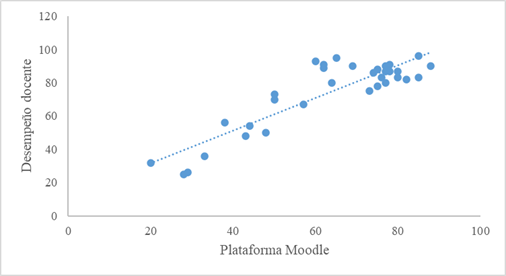Moodle platform and its relationship with teacher performance at Simón Bolívar private school
DOI:
https://doi.org/10.51252/rceyt.v2i2.610Keywords:
pedagogical knowledge, performance, learning managementAbstract
The objective of the research was to determine the relationship between the Moodle platform and teaching performance at Colegio Particular Simón Bolívar. The research was basic, quantitative approach, deductive method, correlational level, and non-experimental cross-sectional design. The population and sample consisted of 33 teachers of the institution. The applied technique was the survey, and the instrument was the questionnaire. It was found that there is a significant and positive relationship between the Moodle platform and disciplinary knowledge of the content (Rho = 0.711; p = 0.000). There is a significant and positive relationship between the Moodle platform and pedagogical knowledge (Rho = 0.687; p = 0.000). There is a significant and positive relationship between the Moodle platform and technological knowledge (Rho = 0.663; p = 0.000). There is a significant and positive relationship between the Moodle platform and compliance with standards (Rho = 0.448; p = 0.009). It was concluded that there is a significant relationship between the Moodle platform and teaching performance at Colegio Particular Simón Bolívar. This was statistically demonstrated by means of Spearman's Rho correlation test (Rho = 0.673; p = 0.000). Where the significance level was less than the margin of error considered, p < 0.05.
Downloads
References
Cervantes Holguín, E., & Gutiérrez Sandoval, P. R. (2020). Resistir la Covid-19. Intersecciones en la Educación de Ciudad Juárez, México. Revista Internacional de Educación Para La Justicia Social, 9(3), 7–23. https://doi.org/10.15366/riejs2020.9.3.001
Hernández Sampieri, R., Fernández Collado, C., & Baptista Lucio, M. del P. (2014a). Metodología de la Investigación (5th ed.). McGRAW-HILL / INTERAMERICANA EDITORES, S.A.
Hernández Sampieri, R., Fernández Collado, C., & Baptista Lucio, P. (2014b). Metodología de la investigación (6ta ed.). McGraw-Hill Education.
Herrera Nieves, L. B. (2020). Evaluación de la Usabilidad de Moodle. Ambientes Educativos Virtuales Inclusivos a partir del Diseño Universal de Aprendizaje [Universidad de Granada]. http://hdl.handle.net/10481/62891
INEI. (2020). El 94,2% de la población de 6 a 11 años de edad matriculados en educación primaria recibieron clases virtuales. Instituto Nacional de Estadística e Informática. https://m.inei.gob.pe/prensa/noticias/el-942-de-la-poblacion-de-6-a-11-anos-de-edad-matriculados-en-educacion-primaria-recibieron-clases-virtuales-12384/#:~:text=En el segundo trimestre del,laptop%2C tablet y celular)%3B
Lisnani, L., Putri, R. I. I., Zulkardi, & Somakim. (2020). Designing Moodle features as e-learning for learning mathematics in COVID-19 pandemic. Journal of Physics: Conference Series, 1657, 012024. https://doi.org/10.1088/1742-6596/1657/1/012024
Martínez Jiménez, S. S. (2021). Impacto del uso de la plataforma Moodle en las competencias tecnológicas de los docentes de secundaria del colegio San Judas Tadeo [Universidad Católica Santo Domingo]. https://www.academia.edu/49155260/Impacto_competencias_tecnológicas_usuarios_Moodle
MINEDU. (2018). Encuesta Nacional a Docentes de Instituciones Educativas públicas y privadas 2018 (p. 33). Ministerio de Educación. http://www.minedu.gob.pe/politicas/docencia/pdf/endo-2018.pdf
MINEDU. (2021). Encuesta Nacional de a Docentes. Ministerio de Educación. http://www.minedu.gob.pe/politicas/docencia/encuesta-nacional-a-docentes-endo.php
Ñaupas Paitán, H., Mejía Mejía, E., Novoa Ramírez, E., & Villagómez Paucar, A. (2014). Metodología de la investigación Cuantitativa - Cualitativa y Redacción de la Tesis (4th ed.). Ediciones de la U. https://doi.org/10.1017/CBO9781107415324.004
Rivero Padrón, Y., Patora Alejo, B., & Albuja Mariño, P. A. (2020). La plataforma Moodle como recurso tecnológico de complemento para la función docente universitaria. Revista Conrado, 16(73), 237–243. http://scielo.sld.cu/pdf/rc/v16n73/1990-8644-rc-16-73-237.pdf
Roca Tapia, C. (2021). La plataforma Moodle en la competencia digital docente para la educación virtual, San Juan de Lurigancho 2021 [Universidad César Vallejo]. https://hdl.handle.net/20.500.12692/69991
Rodríguez Figueroa, J. J., & Huamanchumo Venegas, H. (2015). Metodología de la investigación científica en las organizaciones (1st ed.). Editorial Summy de José Jorge Rodríguez Figueroa.
Salvatierra Melgar, A., Cruz Montero, J. M., & Esquiagola Aranda, E. A. (2020). Uso del Moodle en el entendimiento de la tecnología como rasgo potencial del docente. Revista Varela, 21(58), 69–76. http://www.revistavarela.uclv.edu.cu/index.php/rv/article/view/109/252
Sangrà, A., Guitert, M., & Romeu, T. (2022). Ensuring Online Quality Teaching through Initial Teachers’ Training and Support. In Quality in Online Programs (pp. 173–192). BRILL. https://doi.org/10.1163/9789004510852_010

Downloads
Published
How to Cite
Issue
Section
License
Copyright (c) 2023 Claudia Cristina Marina-Vergara

This work is licensed under a Creative Commons Attribution 4.0 International License.



